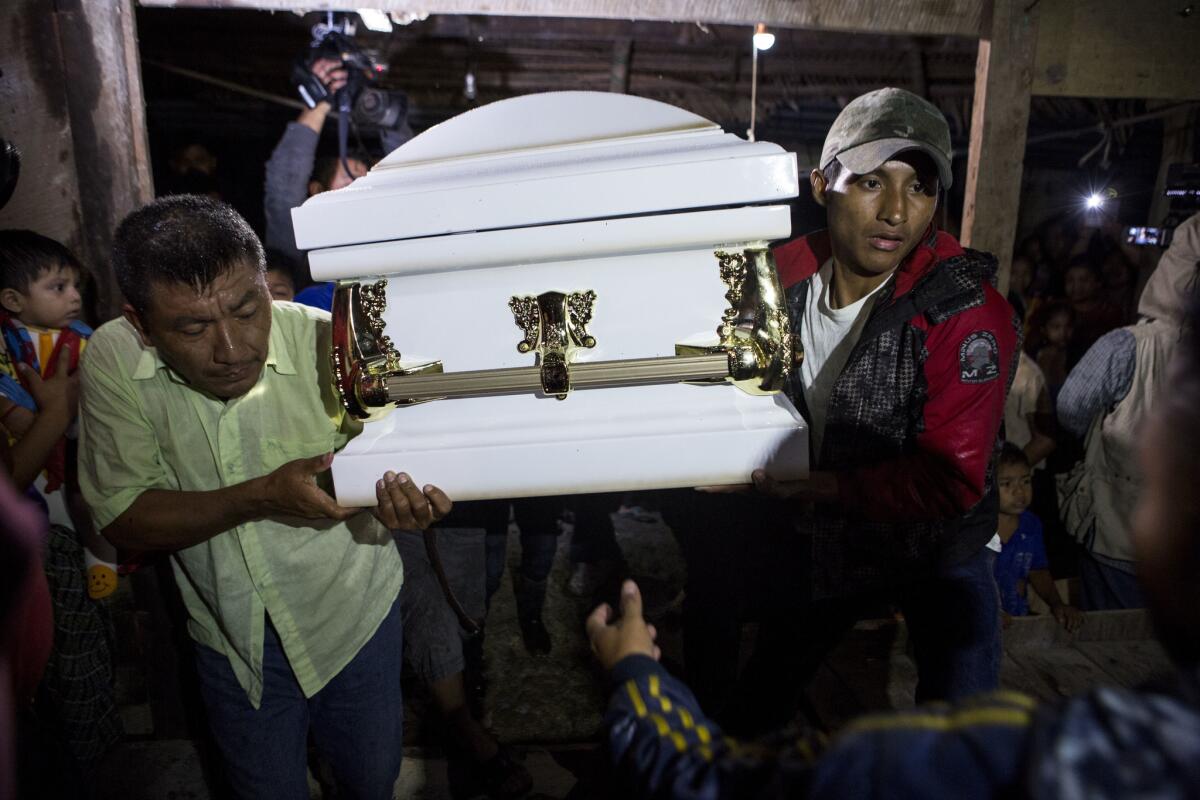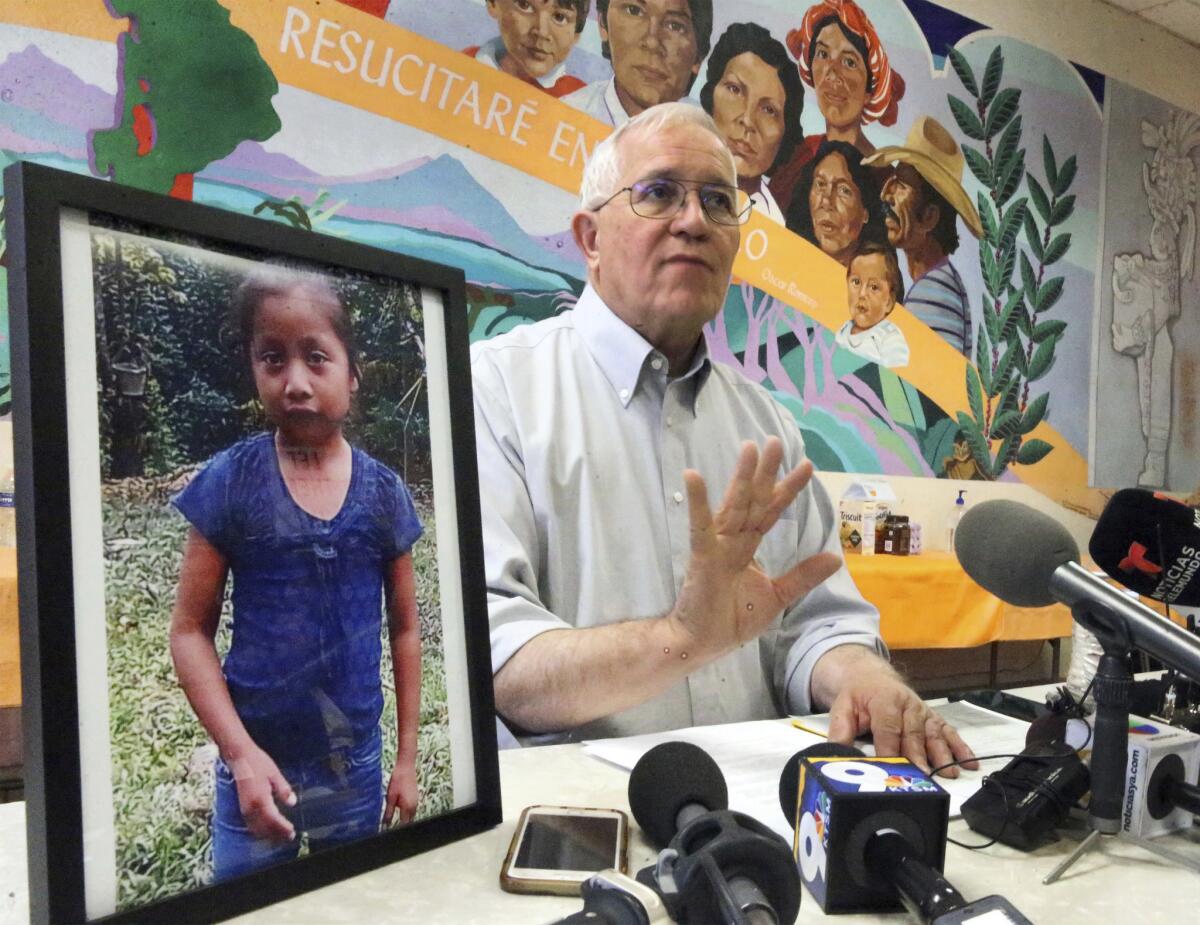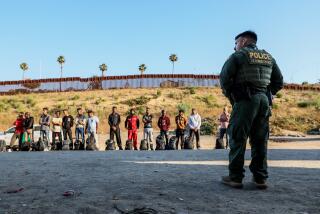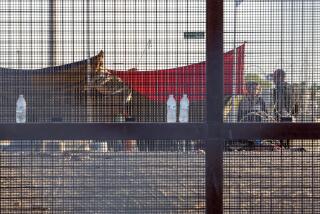Six migrant children have died in U.S. custody. Here’s what we know about them

- Share via
Reporting from Houston — Six migrant children — five from Guatemala and one from El Salvador — have died in federal custody since September.
Most of the children died after becoming ill in Border Patrol’s crowded temporary holding areas.
On Monday, a 16-year-old died after being diagnosed with the flu; 32 people in the McAllen, Texas, facility where he had been held were later quarantined with the flu.
On Wednesday, the Trump administration said a 10-year-old girl from El Salvador with a history of congenital heart defects had died in a hospital in federal custody in September. The Times confirmed her identity as Darlyn Cristabel Cordova-Valle; she was trying to reach Nebraska, where her mother lives.
The deaths have led advocacy groups and lawmakers to call for investigations into immigrant detention conditions on the border. On Thursday, Democratic members of the Congressional Hispanic Caucus and House Judiciary Committee — three from Texas and one from Florida — wrote to President Trump, asking him to confirm that there have been no other unreported migrant deaths.
When pressed by lawmakers this week about conditions in temporary holding facilities at the border, Acting Homeland Security Secretary Kevin McAleenan acknowledged that “those conditions are not acceptable.”
The deaths come amid a record increase in migrant families and children crossing the border. McAleenan appealed to Congress this week for more funding to address the surge.
When McAleenan testified before Congress in December, he did not notify lawmakers that a 7-year-old girl had died in Border Patrol custody three days before. Homeland Security officials later ordered medical checks of all children in their custody and expanded medical screenings of migrants as they arrived at the border. But since the medical screenings were added, three more children have died.
Here’s what we know so far about the children’s deaths.
Darlyn Cristabel Cordova-Valle, 10, El Salvador
Days after 10-year-old Darlyn Cristabel Cordova-Valle crossed into the U.S. last year on her way from El Salvador to Nebraska, Border Patrol agents determined she had a debilitating heart condition.
Darlyn crossed the border on her own near Hidalgo, Texas, and was caught by Border Patrol agents at 9:45 p.m. March 1, according to the agency. The next morning, she had a welfare check, complained of chest pains and was sent to Edinburg Children’s Hospital, according to a Border Patrol statement. On March 3, the hospital cleared Darlyn for travel, and she was returned to the Border Patrol, which transferred her to the Department of Health and Human Services.
Later that day, Health and Human Services placed Darlyn at a Baptist Christian Family Services shelter in San Antonio, according to the Border Patrol statement. By then, she was considered “medically fragile,” with a history of congenital heart defects, according to Health and Human Services spokesman Mark Weber.
Complications following a surgical procedure in San Antonio left the girl in a coma, Weber said. She was transported to a nursing facility in Phoenix for palliative care in May, then to a nursing facility in Omaha on Sept. 26, to be closer to her family, he said.
Three days later, the girl was taken to Children’s Hospital of Omaha, where she died because of fever and respiratory distress, Weber said.
Darlyn’s body was sent back to El Salvador for burial, according to Carlos Martinez, past president of the Salvadoran Civic Assn. of Nebraska. The nonprofit organization in Omaha, where Darlyn’s mother lives, had helped arrange legal and postmortem assistance for the girl’s family, he said.

Jakelin Caal Maquín, 7, Guatemala
Jakelin Caal Maquín died Dec. 8, soon after she was apprehended by Border Patrol with her father after they entered the U.S. illegally, aiming to seek asylum.
There were traces of streptococcus bacteria in Jakelin’s lungs, adrenal gland, liver and spleen, according to her autopsy. The infection led to sepsis and organ failures, it said.
Jakelin was hospitalized about 12 hours after she and her father, Nery Gilberto Caal Cuz, 29, were caught, according to U.S. Customs and Border Protection. They were stopped with more than 150 people Dec. 6 on a remote stretch of New Mexico’s border.
Jakelin and her father were put on a bus bound for a Border Patrol station, and just before it left at 5 the next morning he reported that she was vomiting, the Border Patrol said. When the bus arrived about 90 minutes later, Jakelin’s temperature had reached 105.7 degrees and an emergency medical technician had to revive her, Border Patrol said. She was flown to a hospital in El Paso, where she died the next day.
Before the autopsy results, U.S. officials claimed the girl had not been given food or water for days before being detained, a contention her father strongly denied through his attorneys.
Felipe Gomez Alonzo, 8, Guatemala
Felipe Gomez Alonzo died in Border Patrol custody on Christmas Eve. He suffered a staph infection in his lungs, the bacteria entered his bloodstream and he developed sepsis, according to an autopsy by New Mexico’s medical examiner.
Felipe and his father, Agustin Gomez Perez, were caught by the Border Patrol in mid-December after seeking asylum in an attempt to escape extreme poverty, relatives told CNN. Gomez’s daughter said he took out a loan to pay for the journey after hundreds of others from their rural community in western Guatemala successfully crossed the U.S. border with their children. He took Felipe, his eldest son.
Once in Border Patrol custody, Felipe and his father were taken to several holding areas, including the Paso del Norte international bridge in El Paso, where authorities later held people in hastily erected pens, with families sleeping on bare dirt.
The day before Felipe died, the father and son were taken to the Border Patrol station in Alamogordo, N.M., at about 1 a.m., Border Patrol said. An agent there noticed Felipe was coughing with “glossy eyes,” the agency said, and he complained of a sore throat, congestion and fever, according to the autopsy.
Felipe was hospitalized, registered a 103-degree fever and tested positive for the flu. He was held for observation for 90 minutes, released with prescriptions for amoxicillin and ibuprofen, then fell sick hours later and was readmitted to the hospital, where he died.
Juan de León Gutiérrez, 16, Guatemala
After crossing the border on his own, Juan de Leon Gutiérrez was sent to Casa Padre, a federally contracted shelter run by Austin-based nonprofit Southwest Key in Brownsville, Texas.
Border Patrol agents caught Juan near El Paso on April 19 and took him to Casa Padre the next day. Shelter staff noticed he was sick on April 21 and he was hospitalized. Nine days later, he died after suffering complications from an infection in his brain’s frontal lobe, authorities said.
Juan’s former teacher told CBS News that he was a “very nice student, intelligent, creative, but shy.” He said the boy helped his father in the coffee fields, where drought and depressed prices have led many to migrate north.
When Juan missed class — often because he had to help his father farm — he would run out to the road at day’s end to find his teacher walking home and explain.
“Juanito was a very humble child full of dreams,” teacher Jimmy Cristian Gutiérrez García told CBS. “He was very cheerful and responsible in his studies and chores. There was always a smile and a greeting for his classmates and teachers.”
Wilmer Josué Ramírez Vásquez, 2½, Guatemala
Wilmer Josué Ramírez Vásquez died May 14 after being hospitalized for weeks in Texas, according to U.S. and Guatemalan authorities.
He was taken into custody with his mother by Border Patrol agents April 3 near Paso del Norte international bridge. Three days later, the boy’s mother told agents her son was ill and he was transferred to Providence Children’s Hospital in El Paso, according to Border Patrol officials.
The boy remained hospitalized for about a month before he died.
Guatemala’s consul in Del Rio, Texas, said the boy had a high fever and difficulty breathing, and had been diagnosed with pneumonia. The El Paso medical examiner’s office is performing an autopsy, and results were pending Friday, a spokeswoman said.
Carlos Hernandez Vásquez, 16, Guatemala
Carlos Hernandez Vásquez was found unresponsive Monday morning in a Border Patrol temporary holding facility, hours after a nurse diagnosed him with the flu, an agency spokesman said.
The teen was taken into custody after crossing the southern border in Texas’ Rio Grande Valley on May 13 with 70 other migrants, according to the agency. He was held at a processing facility for six days before being transferred Sunday to a Border Patrol station in Weslaco, where he said he felt sick and was prescribed Tamiflu.
It’s not clear why Carlos was not hospitalized or how frequently he was checked during his final hours. Border Patrol officials said they did a wellness check an hour before the youth was found unresponsive.
It’s also not clear why Border Patrol didn’t transfer Carlos to the Department of Health and Human Services within 72 hours, as required by law for youths who arrive at the border without parents. Border Patrol officials have not said why Carlos’ transfer was delayed, however, they have noted that HHS requires youths be “fit to travel.”
The FBI, local police, and the Department of Homeland Security Inspector General are investigating the boy’s death.
More to Read
Sign up for Essential California
The most important California stories and recommendations in your inbox every morning.
You may occasionally receive promotional content from the Los Angeles Times.










